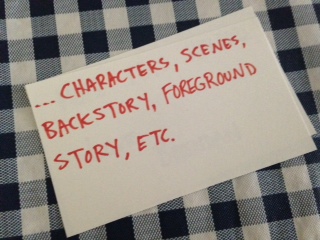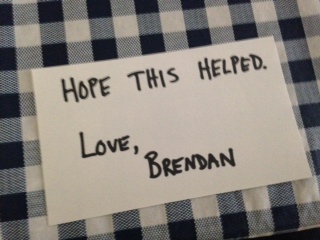Written by Brendan O’Meara
The following is a 1,685-word transcription, basically word-for-word, from Brian Koppelman’s great podcast The Moment. Go subscribe to it. It’s excellent. I excised this little chunk from about Minutes 19 to 30 with Koppelman’s interview with Craig Mazin, screenwriter of such movies as The Hangover 2 and Identity Thief. Mazin is a very sharp, very smart man.
They touch upon what every writer deals with at some point. Athletes know this better than anyone. At some point you reach a wall where your delusions smack into reality (this reality is usually a fastball so fast it has its own soundtrack). It doesn’t matter how badly you want to play profession baseball, but if you don’t have the physical tools, you just won’t make it. It’s that simple. With the arts? It’s a harder reality to face. It just is.
Koppelman also has a great Vine feed where he truly empowers the creatively blocked to pursue their creative dreams. That doesn’t mean everyone will make it. Most will fail (most have to fail), but he gives you the permission to find out. Mazin gives you the permission to quit.
Read this transcript. I think it’s important stuff. They hit on topics I’ve struggled with for the past few years. I hope you find as much value in this as I have. K is for Koppelman. M is for Mazin. Enjoy.
///
K: When did you realize there’s this call to write, to create, to be an artist?
M: When I was in college, it started to occur to me that I should do the thing that made me the happiest. That somebody will tell you that you have to do what you love. But that also is kind of a fortune cookie. Most people can’t. They just can’t. It would be a bad, awful world if everybody just insisted on doing what they loved poorly. You watch people love to sing and they can’t.
K: You and I argue about this, encouraging people. As you did, I, at a certain point, had to do this to be a happy person. I ran from it for a long time. I was 30 before I wrote my first script (Rounders). What people forget, that you alluded to, they take from your message or mine. You made that decision, secondly, bundled with that, is you have to work. You may have to work the hardest you’ve ever worked to do the thing that makes you happy. The problem is to go after that in a responsible way so you don’t hurt the people around you. And be ready to kill yourself to do it.
M: And also be ready to quit. This is where you and I separate. The truth is this is not a business where you can, or any artistic pursuit, it’s not a business where effort alone will get it done. You can kill yourself and get nowhere because you’re not very good. That’s just part of reality. I had no concept of whether I was good or not good. I gave it my good shot. I realized maybe my wits and command of the English language and my ability to write. And, more importantly, my ability to hear, accept, understand and then rewrite. Was maybe something that set me apart.
K: You realized you had a special skill.
M: It seemed to be. Which was surprising to me because I didn’t know who could do what.
K: I don’t think. You’re attaching to people that they need to have commercial success or monetary success. What I found is that people who don’t pursue a calling and don’t pursue it in some way they become toxic to themselves and people around them. I agree with you. It’s a numbers game. Clearly, most people who try are going to fail at this, right? The guy who wrote The King’s Speech was 72 years old.
M: He had had a career prior to that.
K: But a career filled with more downs than ups.
M: Sure, don’t get me wrong. I don’t equate financial success with quality whatsoever. Frankly, if you are appreciated by some people routinely then it’s working. However, let’s be clear, most people in American and certainly the rest of the world, don’t have the resources to pursue something that doesn’t at least remunerate them in some way. If they are responsible, for anybody, including themselves, then they have to deal with that reality. If you are lucky enough to be independently wealthy and you love writing, and nobody’s giving you the feedback you want right now, then that’s OK.
K: I remember reading about that guy, I was just out of college, that guy who wrote [David Guterson]the book Snow Falling on Cedars. I remember he had worked two jobs and would get up at four in the morning and write for an hour. There’s tremendous sacrifice to make it happen.
M: Yes. We tell those stories. What we don’t tell are the stories of the people who wake up at four in the morning, write for two hours, write for ten years, while everyone is telling them this is incompetent. Sometimes on our podcast [Scriptnotes], we’ll get people asking questions, “I’m 45. I’ve been a nurse. I’m thinking of quitting being a nurse, moving to L.A. and starting to write. I’ve never really done it before, but this is my dream.” And you know, yes, maybe just stay a nurse right now and maybe write in the evening. Because … I get so scared by these people.
K: I remember going to my father. Big moment, 29, 30 years old, I have a baby, “Dad, I want to be a writer.” He just looked at me and said, “So write.” I was working. I had a great job. I was educated as a lawyer and all that stuff. I made money before that. My point is, I didn’t quit my job. I couldn’t. I had to work my job. His point to me was, “You want to write, get up earlier, and write.” And that’s what I did.
M: Which is true. By the way, when I started writing that’s what I did. My first job in Los Angeles, I made $20,000 a year. I was basically a file clerk. When I came home in the evening I would write.
K: Yes. When I look at those people on American Idol who can’t sing, I think of all the people around them who did them a tremendous disservice by not saying you’re not ready. Work harder…
M: I still think you’re doing them a disservice. I really do. When you’re saying “You’re not ready, work harder,” you can listen to those people and you know in your heart, there’s no amount of work, no amount of readiness. That’s why Simon Cowell honestly was the most interesting thing on television because he told the truth. He was the first person to say ‘You’ll never be able to do this. Stop it.’ Which was remarkable.
K: I agree with that. I agree and I can look at those people. That was my job for nine years was to evaluate musical talent. I would toss seventy demo tapes into the garbage for the one that I would listen to all the way through. What I would’ve said back then is they were bereft of any talent. Then, we know the stories of the people who were rejected. Whether you like The Fountainhead or not, forty publishers said to her [Ayn Rand], this is useless, use it as toilet paper.
M: Every successful person has that story. Every successful person can turn to you and say here’s a list of the people who thought I was no good and that I would never make it. The problem is that is how Americans evaluate this. We always evaluate it from the perspective of the winners. Always. This is the paradox of winning. You must believe that you can win in order to win, even when people tell you you can’t. Also, at the same time, most people can’t.
K: If we live one time, I would rather say to people, I would rather give them all the real information, “It’s really hard, I see no evidence you can win at this, if you can do anything else, do something else, but if you can’t, then work at it every day as hard as you can.”
M: I’m perfectly happy to say that. Listen, even if somebody says, “I love to sing, I know I’m not great yet, I know I’m not Broadway ready, but I love it so much that I’m going to do community theater. I’m going to keep trying. I’m going to take some classes, but in the meantime I’m going to be a responsible person to myself and for the people that rely on me.” God bless you. Sing for the rest of your life. Being creative and expressive is an amazing thing.
K: I get it. You feel you have an obligation to say to people, ‘Don’t ruin your life.’
M: 100 percent, because they do.
K: I feel an obligation to say to people, because of when I started. You see, you were 20 years old when you figured it out. I was 30 with a life. I know how painful it was not to do it. I want to say to people. I understand how painful it is to not do it, so, give it shot.
M: You’re coming at it from the point of view of someone who has a 100 percent chance of being successful because you’re successful. You see what I mean? The people who win the lottery always tell people to play the lottery. Why shouldn’t they? You won! It’s winnable! It’s a tricky thing. We have a responsibility to be honest with people. One of the best things I ever heard. We did a live podcast event and a guy got up and said, “I was trained to be a psychotherapist. Once I was ready to do it I said I want to pursue my dream of writing and I pursued it for ten years and you guys gave me the courage to quit.” I thought it was so beautiful. He’s going to be a therapist now and help people. I actually thought that was beautiful. In the end, while we romanticize writing, it is far more important to cure people of disease and illness than it is to write movies. God knows that is ture.
K: No one’s going to argue with that. The question is, when somebody can quit, or when the killing of that dream—your guy Bruce, [from The River] Is a dream a lie if it don’t come true or is it something worse? People who walk around with a sense that they gave up are sometimes very difficult to live with. It’s thorny and difficult.
M: You don’t want to live with regrets. In your 20s is a great time to try when you’re on your own and you don’t have a wife and kids or a husband and kids, and do it. Take that risk with your life. Always take a risk with your life. But then realize that if you stick with that risk beyond the point of that is reasonable, you are actually now doing the opposite of taking a risk. What you’re really doing is running from the other risks you must take to make your life pay off.
K: You’re now telling yourself a story and becoming delusional. No question about that.
///










